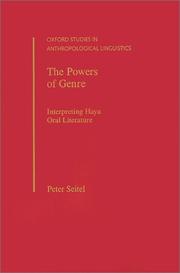| Listing 1 - 3 of 3 |
Sort by
|

ISBN: 1280761520 0198027702 9780198027706 019511700X 9780195117004 0197722237 Year: 1999 Publisher: New York : Oxford University Press,
Abstract | Keywords | Export | Availability | Bookmark
 Loading...
Loading...Choose an application
- Reference Manager
- EndNote
- RefWorks (Direct export to RefWorks)
The Powers of Genre describes a method for interpreting oral literature that depends upon and facilitates dialogue between insiders and outsiders to a tradition. Seitel illustrates this method with lively examples from Haya proverbs, folktales, and heroic verse. He then focuses on a single epic ballad to demonstrate, among other things, why stanzas need not rhyme, and how significance needs time in oral poetry and narrative. Making a controversial claim that an heroic age, similar to that of Ancient Greece, existed in Sub-Saharan Africa, this work will intrigue anyone who works in oral literature.
Discourse analysis, Narrative --- Folk literature, Haya --- Haya (African people) --- Haya language --- Oral tradition --- Tradition, Oral --- Oral communication --- Folklore --- Oral history --- Aiba language --- Ekihaya language --- Heia language --- Kiziba language --- Luhaya language --- Lusiba language --- Ruhaya language --- Ziba language --- Bantu languages --- Aiba (African people) --- Babumbiro (African people) --- Bahamba (African people) --- Bahaya (African people) --- Bahyoza (African people) --- Banyambo (African people) --- Basiba (African people) --- Baziba (African people) --- Buhaya (African people) --- Ekihaya (African people) --- Haya (African tribe) --- Heia (African people) --- Kiziba (African people) --- Ruhaya (African people) --- Wahaya (African people) --- Wassiba (African people) --- Ziba (African people) --- Bantu-speaking peoples --- Ethnology --- Haya folk literature --- Haya literature --- Narrative discourse analysis --- Narration (Rhetoric) --- History and criticism. --- Haya language. --- Folklore.
Book
ISBN: 0253202426 0253159172 Year: 1980 Publisher: Bloomington (Ind.) : Indiana university press,
Abstract | Keywords | Export | Availability | Bookmark
 Loading...
Loading...Choose an application
- Reference Manager
- EndNote
- RefWorks (Direct export to RefWorks)
Haya (African people) --- Oral tradition --- Tales --- Tales --- Folklore. --- History and criticism
Book

ISBN: 9780292735095 Year: 2021 Publisher: Austin
Abstract | Keywords | Export | Availability | Bookmark
 Loading...
Loading...Choose an application
- Reference Manager
- EndNote
- RefWorks (Direct export to RefWorks)
| Listing 1 - 3 of 3 |
Sort by
|

 Search
Search Feedback
Feedback About UniCat
About UniCat  Help
Help News
News